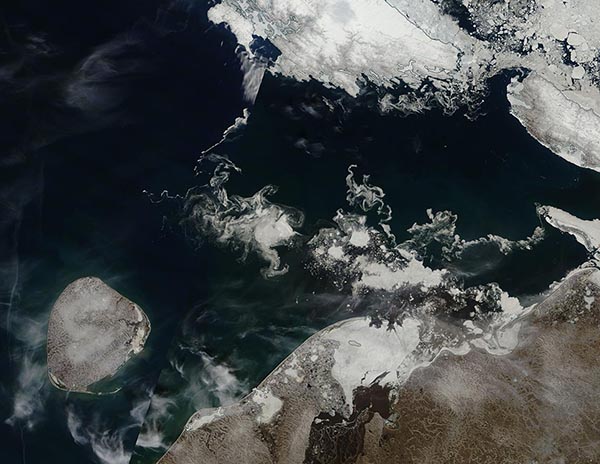Images
June 2, 2022 - Sea Ice in the Barents Sea
Tweet
As days lengthen and air temperatures increase in late spring, the wintery covering of sea ice worn by the Barents Sea begins to melt. With daytime temperatures in Murmansk, Russia reaching 50˚F (10˚C) since May 6, and nighttime lows above freezing since May 10, regional melting has become more rapid in late May 2022. Murmansk is located to the west of the area captured in this image.
The Moderate Resolution Imaging Spectroradiometer (MODIS) on board NASA’s Terra satellite acquired a true-color image of the Barents Sea on May 31. At that time, although most of the Barents Sea was open water, thin filigrees of floating sea ice remained visible between the round Kolguyev Island, in the west, and the Novaya Zemlya group of islands in the northeast. The landmass sitting in the southeast belongs to the Zapolyarny District of Nenets Autonomous Okrug, Russia. Fast ice (ice clinging to a landmass) remains along Novaya Zemlya, the edges and bays of the Zapolyarny District, and in a very few locations along the northeastern and southwestern edges of Kolguyev Island. In the far northeast, behind Novaya Zemlya, abundant sea ice remains in the Kara Sea, although it is cracked and thinning.
Image Facts
Satellite:
Terra
Date Acquired: 5/31/2022
Resolutions:
1km (60.2 KB), 500m (331.7 KB), 250m (652.1 KB)
Bands Used: 1,4,3
Image Credit:
MODIS Land Rapid Response Team, NASA GSFC
Tweet
As days lengthen and air temperatures increase in late spring, the wintery covering of sea ice worn by the Barents Sea begins to melt. With daytime temperatures in Murmansk, Russia reaching 50˚F (10˚C) since May 6, and nighttime lows above freezing since May 10, regional melting has become more rapid in late May 2022. Murmansk is located to the west of the area captured in this image.
The Moderate Resolution Imaging Spectroradiometer (MODIS) on board NASA’s Terra satellite acquired a true-color image of the Barents Sea on May 31. At that time, although most of the Barents Sea was open water, thin filigrees of floating sea ice remained visible between the round Kolguyev Island, in the west, and the Novaya Zemlya group of islands in the northeast. The landmass sitting in the southeast belongs to the Zapolyarny District of Nenets Autonomous Okrug, Russia. Fast ice (ice clinging to a landmass) remains along Novaya Zemlya, the edges and bays of the Zapolyarny District, and in a very few locations along the northeastern and southwestern edges of Kolguyev Island. In the far northeast, behind Novaya Zemlya, abundant sea ice remains in the Kara Sea, although it is cracked and thinning.
Image Facts
Satellite:
Terra
Date Acquired: 5/31/2022
Resolutions:
1km (60.2 KB), 500m (331.7 KB), 250m (652.1 KB)
Bands Used: 1,4,3
Image Credit:
MODIS Land Rapid Response Team, NASA GSFC




